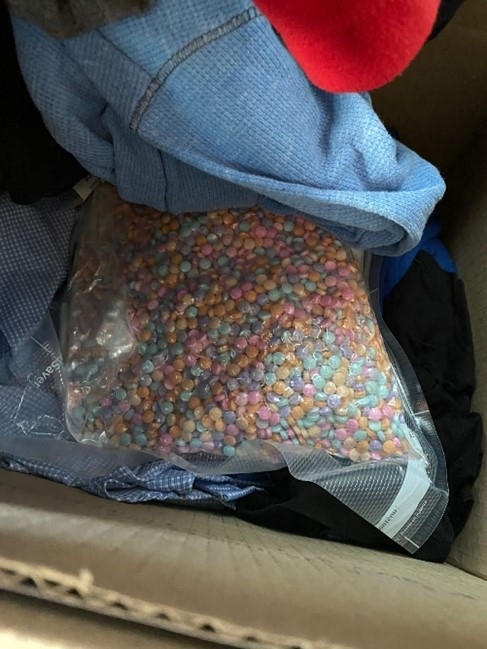Seven Sinaloa Cartel Members and Associates Sentenced to Prison for Trafficking Fentanyl, Methamphetamine, and Cocaine
Seven members and associates of the Sinaloa Cartel have been sentenced to prison for their role in a drug trafficking conspiracy involving fentanyl, methamphetamine, and cocaine. The defendants previously pleaded guilty in this matter.
Hector Alejandro Apodaca-Alvarez, 53, of Somerton, Arizona; Mark Anthony Roque Bustamante, 33, of Yuma, Arizona; Jorge Moreno, 28, of San Luis Rio Colorado, Mexico; Jonathan Nicholas Chavez, 25, of Brawley, California; Luis Tejada Velasquez, 37, of San Luis Rio Colorado, Mexico; Austin Toma Grupee, 43, of Providence, Rhode Island; and Jose Chavez Zaragoza, 38, of Yuma, Arizona, participated in the drug trafficking conspiracy to distribute the controlled substances. The defendants were arrested in the United States.
According to the Drug Enforcement Administration’s (DEA) National Drug Threat Assessment, the Sinaloa Cartel is at the heart of the fentanyl crisis. The cartel has developed global supply chain networks and operate clandestine labs in Mexico where they manufacture these drugs and then utilize their vast distribution networks to transport the drugs into the United States. Fentanyl is the deadliest drug threat the United States has ever faced, killing 38,000 Americans in the first six months of 2023 alone. Just one fentanyl pill can kill. Two milligrams of fentanyl is considered a potentially fatal dose and laboratory testing indicates seven out of 10 pills seized by the DEA contain a lethal dose of fentanyl.
“The significant sentences imposed by the court reflect the deadly nature of the crimes committed by Mexican cartel members in flooding our communities with fentanyl and other lethal drugs,” said Deputy Attorney General Lisa Monaco. “Our law enforcement officers work across the U.S. and around the globe to combat the cartels’ firearms and drug trafficking, which wreak so much violence and devastation in our communities.”
“Guns and drugs are often linked, particularly when it comes to the cartels,” said Director Steven Dettelbach of the Bureau of Alcohol, Tobacco, Firearms and Explosives (ATF). “ATF is committed to working with all our partners to hold accountable those who spread poison in our streets and arm those who supply that poison. This case exemplifies the incredible work going on every day by ATF agents and analysts around the country to protect the American public from dangerous criminals.”
“When you consider the quantity of drugs being trafficked and the deleterious impact illicit narcotics have on our community, it is readily apparent that these defendants sold drugs for the sole purpose of profiting off a public health crisis — addiction,” said U.S. Attorney Markenzy Lapointe for the Southern District of Florida. “The fentanyl epidemic, to include here in south Florida, has caused a deafening silence as thousands of people have overdosed and died. We commend our partner agencies, as we work collectively to prosecute the members and associates of cartels that fuel the drug poisoning crisis and traffic in firearms.”
From June 2022 through May 2023, Apodaca-Alvarez, who was previously convicted of narcotics trafficking-related offenses in three federal districts prior to his arrest in this case, used the U.S. mail and his own trucking business to send tens of thousands of pressed fentanyl pills and kilogram-quantities of fentanyl, methamphetamine, and cocaine to an undercover agent based in South Florida. The undercover agent also conducted narcotic and monetary transactions with Apodaca-Alvarez and codefendants in California, Arizona, and Massachusetts. Apodaca-Alvarez told the undercover agent he was coordinating directly with members of the Sinaloa Cartel to facilitate the large-scale distribution of narcotics and stated that the potency of the pressed fentanyl pills that he sold “was dropping people everywhere.” Apodaca-Alvarez worked directly with Ismael “El Mayo” Zambada Garcia, a co-founder of the Sinaloa Cartel.
During the conspiracy, Apodaca-Alvarez coordinated with the remaining codefendants to assist in distributing the controlled substances throughout the United States, including in Arizona, California, Florida, Kentucky, Massachusetts, Rhode Island, Texas, and Virginia.
Law enforcement officers identified Roque Bustamante, nicknamed the “Skittles Man,” due to his distribution of rainbow-colored fentanyl pills, as Apodaca-Alvarez’s primary source of supply. In recorded conversations, Apodaca-Alvarez and Roque Bustamante inquired if the undercover agent would supply them with firearms, including .50 caliber high powered rifles to be smuggled into Mexico.
Apodaca-Alvarez was ultimately arrested in South Florida while delivering 16 kilograms of fentanyl and 2 kilograms of cocaine to the undercover agent during an undercover operation. Moreno was present with Apodaca-Alvarez during the arrest operation.
In total, law enforcement seized approximately 21 kilograms of pure fentanyl; 70 thousand rainbow-colored, pressed fentanyl pills; 3,000 M30 pressed fentanyl pills, blue in color; 243 pounds of crystal methamphetamine; two kilograms of cocaine; and 24 firearms (including 18 rifles and six pistols) related to this conspiracy.
Tejada Velasquez was sentenced yesterday to 242 months in prison.
On May 2, Roque Bustamante was sentenced to life in prison, Grupee was sentenced to 262 months in prison, and Chavez was sentenced to 57 months in prison.
On March 21, Apodaca-Alvarez was sentenced to life in prison, Moreno was sentenced to 121 months in prison, and Zaragoza was sentenced to 47 months in prison. In addition, Apodaca-Alvarez agreed to the forfeiture of his entire trucking business and Arizona-based residence.
The ATF Miami Field Division* investigated the case, with assistance from DEA, Homeland Security Investigations Miami, Broward Sheriff’s Office, ATF Los Angeles* Field Division, U.S. Marshals Service, and U.S. Postal Inspection Service.
Assistant U.S. Attorneys Ajay J. Alexander, M. Catherine Koontz, and Brooke Latta for the Southern District of Florida and Assistant U.S. Attorney Addison Owen for the District of Arizona prosecuted the case.
This effort is part of an Organized Crime Drug Enforcement Task Forces (OCDETF) operation. OCDETF identifies, disrupts, and dismantles the highest-level criminal organizations that threaten the United States using a prosecutor-led, intelligence-driven, multi-agency approach. Additional information about the OCDETF Program can be found at www.justice.gov/OCDETF.
*This has been updated to reflect the correct ATF Field Divisions.

 U.S. Department
of Justice
U.S. Department
of Justice

